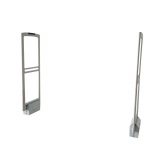In the ever-evolving world of wholesale management, staying up to date with the latest trends and technologies is crucial for success. One such trend that has revolutionized the industry is RFID management. RFID, which stands for Radio Frequency Identification, is a form of technology that uses electromagnetic fields to identify and track tags attached to objects. In this article, we will explore the exciting world of RFID management and discuss how it can transform your wholesale business.
What is RFID management?

RFID management involves the use of RFID technology to streamline and optimize various processes in the wholesale industry. By incorporating RFID labels and RFID tags into products and utilizing RFID readers, businesses can track inventory, monitor supply chains, and improve overall operational efficiency. RFID management offers real-time visibility, accurate data collection, and automation, making it an invaluable tool for wholesale businesses.
The benefits of RFID management

Enhanced inventory control
- RFID tags allow for real-time and accurate inventory tracking, reducing errors and inventory discrepancies.
- Automatic data collection eliminates the need for manual counting, saving time and improving accuracy.
Efficient supply chain management
- RFID technology enables the traceability of products throughout the supply chain, reducing delays and improving logistics.
- Real-time visibility of inventory improves forecasting and planning, leading to better inventory management.
Improved customer satisfaction
- RFID management enables faster and more accurate order fulfillment, resulting in improved customer satisfaction.
- Real-time inventory visibility ensures that products are always available, reducing backorders and stockouts.
Loss prevention
- RFID tags can help mitigate losses due to theft or misplaced items by providing real-time alerts and tracking.
- The ability to track individual items throughout the supply chain makes it easier to identify and prevent losses.
Streamlined operations
- Automation provided by RFID technology reduces manual processes and increases operational efficiency.
- RFID-enabled systems can automatically trigger reordering when inventory levels are low, ensuring uninterrupted supply.
Embracing RFID technology in wholesale businesses
To effectively implement RFID management in your wholesale business, it is crucial to follow a systematic approach. Here are the steps you should consider:

1. Identify areas of improvement
Start by assessing your current operations and identifying the areas where RFID management can bring the most significant benefits. Determine which processes can be automated and streamlined using RFID technology.
2. Choose the right RFID solution
Research and select a reliable RFID solution provider that offers the features and capabilities that align with your business needs. Consider factors such as tag types, reader capabilities, software integration, and scalability. It is important to choose a solution that can seamlessly integrate into your existing infrastructure.
3. Staff training
Provide comprehensive training to your employees on how to use the RFID technology and incorporate it into their daily tasks. Ensure everyone understands the benefits of RFID management and how it can help improve operational efficiency and customer satisfaction. It is important to promote buy-in and ensure that employees feel comfortable and confident using the new technology.
4. Integration with existing systems
Consider how the RFID solution will integrate with your existing systems, such as inventory management software or enterprise resource planning (ERP) systems. Ensure that there is seamless data flow between different systems to avoid any discrepancies or errors.
5. Monitor and evaluate performance
Once the RFID solution is implemented, closely monitor and evaluate its performance. Look for areas of improvement and make adjustments accordingly. Regularly assess the impact of RFID management on your business operations, such as improved inventory accuracy, reduced stockouts, and increased order fulfillment speed.
By following these steps, you can effectively implement RFID management in your wholesale business and reap the benefits of enhanced supply chain visibility, increased operational efficiency, and improved customer satisfaction. With the right RFID solution in place, you can streamline your processes, reduce costs, and stay ahead of the competition.
5 Benefits of RFID management in wholesale businesses

1. Enhanced supply chain visibility
RFID management provides real-time visibility of products throughout the supply chain. Each item is equipped with an RFID tag that contains unique information, enabling businesses to track the movement of goods from manufacturer to distributor to retailer. This visibility allows for better planning and forecasting, reducing delays and improving overall supply chain efficiency. With RFID technology, businesses can quickly locate and retrieve specific items, leading to faster order fulfillment and improved customer satisfaction.
2. Increased operational efficiency
RFID technology automates many manual processes, leading to increased operational efficiency. With RFID tags, businesses can perform inventory counts faster and more accurately, reducing the time and effort required for manual counting. RFID readers can scan multiple items simultaneously, allowing for quicker data collection. This automation not only saves time but also minimizes the risk of human error, leading to more reliable data and improved decision-making.
3. Enhanced theft prevention
Loss prevention is a significant concern for wholesale businesses. RFID tags can play a vital role in mitigating losses due to theft or misplaced items. RFID readers strategically placed in key areas can detect tagged items as they move throughout the supply chain. If an item leaves a designated area without authorization, an alarm is triggered, alerting security personnel. Additionally, the ability to track individual items with RFID technology makes it easier to identify and prevent losses.
4. Effective asset management
RFID technology is not only useful for tracking products but also for managing assets within a wholesale business. By attaching RFID tags to equipment, vehicles, or other valuable assets, businesses can monitor their usage, location, and maintenance schedules. This allows for improved asset utilization, reduced downtime, and better overall asset management. By having accurate and real-time data on asset locations and statuses, businesses can optimize their operations and ensure the longevity of their assets.
5. Cost savings
Implementing RFID management in wholesale businesses can lead to significant cost savings. With accurate and real-time inventory data, businesses can minimize overstocking and stockouts, leading to reduced carrying costs and lost sales. RFID technology streamlines processes, reducing labor costs associated with manual counting and data entry. The enhanced supply chain visibility provided by RFID management eliminates delays and disruptions, ensuring that inventory is always in the right place at the right time.
Conclusion
RFID management is a game-changer in the wholesale industry, providing businesses with enhanced supply chain visibility, increased operational efficiency, and improved theft prevention. The benefits of RFID technology extend beyond inventory tracking, with applications in asset management and cost savings. By embracing RFID management, wholesale businesses can streamline their operations, improve customer satisfaction, and stay ahead of the competition in today’s fast-paced market.


































